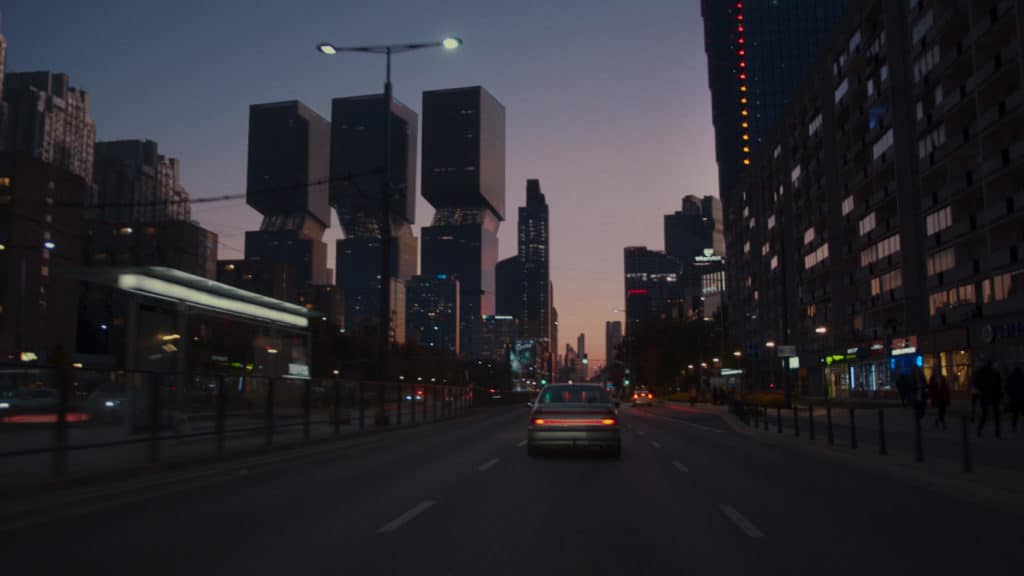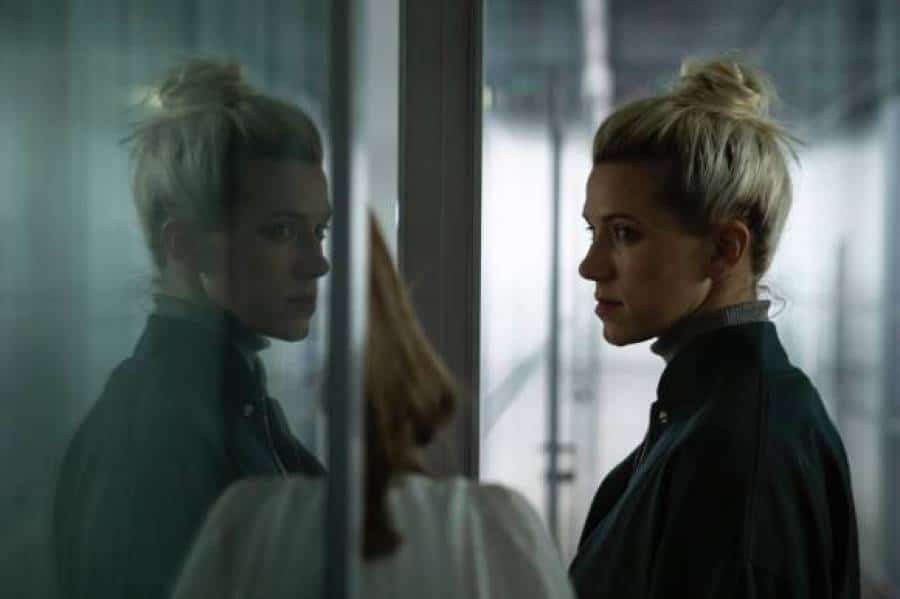
As the gap between science fact and science fiction narrows year on year, some of the best sci-fi simply takes recognisable elements from our day-to-day lives and gives them a tweak or two; that’s often enough to make us question the new normal in some way, and some great cinema has already appeared as a result. Restore Point (2023) does this too, but its key conceit centres around something far more profound and – in this way and to this extent, at least – hitherto unobtainable. But still, all of its developments are made to feel damn close at hand in this often inventive, provocative and smart film.
It’s 2041 in Central Europe: inequality is no thing of the past in this close future. Instead, social issues have escalated to the point that violent crime is fully endemic. Of course, removing the inequalities themselves would be a monstrous, difficult task; instead, a philanthropic organisation called the Rohan Institute has created a piece of technology which can resurrect people who die an untimely death. All they need is to maintain regular back-ups using the company tech: this is the ‘restore point’ of the title. It’s like a cross between a save point in a game, and the ultimate in life insurance. However, it seems that not everyone is fully on board with this techno-ideology; a terrorist organisation called River of Life rejects the notion of a deathless death, and they have been responsible for a number of attacks on the Institute.
We see one such attack-by-proxy taking place as the film opens; detective Em (Andrea Mohylová) is on the trail of a hostage-taker who has been systematically executing prisoners in a well-shielded location (which resists her scanning technology). A gunshot alerts her to the correct floor in the building: ignoring her orders to wait for backup, she tries to save some of the lives she can, but the assailant eludes her, falling readily to his old-fashioned, permanent death – a fate which seems to appal Em, product of her times that she is, but as it turns out she has a particular interest in this organisation, wishing to take them down for personal reasons.
Likewise, River of Life seems to have a personal interest in the Institute, too, seemingly murdering two individuals, a married couple called Kurlstat; David Kurlstat (Matej Hádek) had been working on a new scheme for Rohan, just at the point in time when the Institute was preparing to privatise its services (citing the need to improve those services, though its critics fear a two-tier, overtly wealth-based restoration system is really on the cards). It’s a fraught time, and things grow more complicated when David – believed dead-dead, with no up-to-date restore point – turns up alive, seeking Em’s assistance. There’s a conspiracy taking place, he claims, one which strikes at the heart of the Institute but, as is so often the case, showing that the divide between blame and blamelessness is never straightforward.
In many respects – as you might glean from the last sentence – the main narrative here is a familiar one. We’re used to determined, lone-wolf detectives getting drawn into power struggles and corruption, then struggling to balance duty against conscience. This is handled well in Restore Point; there’s a sense of a steadily ratcheting story, with a plausible (if very closed-off) central protagonist in Mohylová. And, those familiar ideas of secrecy, subterfuge and rebellion help us to orientate through the plot, actually; they’re all-too recognisable. This orientation is particularly helpful as the film’s more expansive ideas develop; rogue hard drives and recovered info are commonplace, sure, but questions about life and death remain more mysterious, and even if some of the surprise factor wears off with regards life, death and coming back from the latter state, it’s still an interesting, subtle idea negotiated through technology which looks like it belongs in our timeline (which provides a nicely uncanny sensation). Restore Point plays around with old, accepted divisions – not only life and death, but also presence/absence, eroding those boundaries too. Things suddenly turn out to be in doubt in the world of Restore Point. The Kurlstats, for example, have already been removed to the morgue, but holograms of their bodies remain in situ for the police to investigate the crime scene as-was. People are there and not there; nothing is certain.
Even the restore point itself is fraught with risk and uncertainty. It promises much, but yet the ‘undiscovered country’ is no less mysterious. The film opts not to investigate the physical and emotional impact of taking this journey in full: it uses death and restoration as more of a philosophical point (with one nod to a classic piece of horror cinema aside) which is a missed opportunity in some respects, though tonally, the film is clear and consistent just the way it is. It has a wealth of visual tricks and lots of grand, nearly-here urban vistas; it looks great. It was great to see a little reference to Arnold Böcklin in there, too, and Pino’s Resurrection of Lazarus (which actually reminds us that important organisations have been promising ‘death is not the end’ for rather longer than we’ve had modern technology). Restore Point tantalises, rather than answers all its own questions, but it’s an engaging and intriguing piece of world building which rewards your attention.
Restore Point (2023) featured at the Fantasia International Film Festival 2023.
